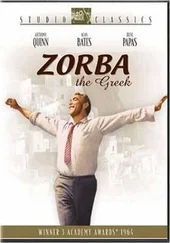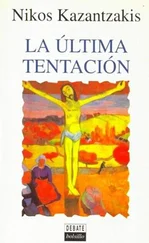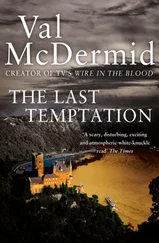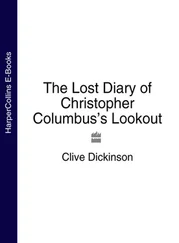Nikos Kazantzakis - The Last Temptation of Christ
Здесь есть возможность читать онлайн «Nikos Kazantzakis - The Last Temptation of Christ» весь текст электронной книги совершенно бесплатно (целиком полную версию без сокращений). В некоторых случаях можно слушать аудио, скачать через торрент в формате fb2 и присутствует краткое содержание. Жанр: Современная проза, на английском языке. Описание произведения, (предисловие) а так же отзывы посетителей доступны на портале библиотеки ЛибКат.
- Название:The Last Temptation of Christ
- Автор:
- Жанр:
- Год:неизвестен
- ISBN:нет данных
- Рейтинг книги:5 / 5. Голосов: 1
-
Избранное:Добавить в избранное
- Отзывы:
-
Ваша оценка:
- 100
- 1
- 2
- 3
- 4
- 5
The Last Temptation of Christ: краткое содержание, описание и аннотация
Предлагаем к чтению аннотацию, описание, краткое содержание или предисловие (зависит от того, что написал сам автор книги «The Last Temptation of Christ»). Если вы не нашли необходимую информацию о книге — напишите в комментариях, мы постараемся отыскать её.
The Last Temptation of Christ — читать онлайн бесплатно полную книгу (весь текст) целиком
Ниже представлен текст книги, разбитый по страницам. Система сохранения места последней прочитанной страницы, позволяет с удобством читать онлайн бесплатно книгу «The Last Temptation of Christ», без необходимости каждый раз заново искать на чём Вы остановились. Поставьте закладку, и сможете в любой момент перейти на страницу, на которой закончили чтение.
Интервал:
Закладка:
His greatest ascetic fervor came after he had taken his degree at the University of Athens and gone to Paris to study philosophy with Henri Bergson. He decided to travel to Mt. Athos in Macedonia, famous for its ancient monasteries and its exclusion of all females-cows and hens as well as women. Kazantzakis remained on the Holy Mountain for six months, alone in a tiny cell, trying through spiritual and bodily exercises to achieve direct contact with the Saviour. Unsuccessful, he decided to renew his allegiance to a saviour he had already found during his studies in Athens and Paris: Nietzsche.
He was thereafter to renounce Nietzsche for Buddha, then Buddha for Lenin, then Lenin for Odysseus. When he returned finally to Christ, as he did, it was to a Christ enriched by everything that had come between.
He was able to return to Christ with conviction precisely because he experienced in his own right the temptations which Christ rejected as false saviours. The same young man who shut himself up in a cell on the mountain where no female has penetrated since the tenth century also came to know the joys of the hearth, for he married in 1911, and if he and his wife eventually began to live a great deal apart, the price in terms of loneliness which his spiritual searchings exacted from him is movingly attested to in his letters. (The marriage ended in divorce; Kazantzakis remarried in 1945)
He was also confronted, like Jesus, with the temptation of violent revolution in the cause of freedom. His knowledge of the heroism of the Cretan revolutionaries had left in him a fervent admiration for the active life, plus a desire to participate in it, and in 1917 this desire was whetted by two things: the Russian Revolution, and his association in a Peloponnesian mining venture with a dynamic man named George Zorbas-an experience immortalized in Kazantzakis’ novel, Zorba the Greek (1946), the principal theme of which is the conflict between action and contemplation. Two years later, having been appointed Director General of the Greek Ministry of Welfare, Kazantzakis had an opportunity to visit Russia, together with Zorbas, in an effort to secure the repatriation of Greek refugees in the Caucasus. The seeds were planted for his short-lived faith in the Bolsheviks.
This faith did not blossom, however, until the middle twenties. At the beginning of the decade he was still unsettled, still searching for his saviour. Although the author of numerous verse plays, and of translations from Bergson, Darwin, Eckermann, William James, Maeterlinck, Nietzsche and Plato, he still did not know the ultimate direction of his life. In Paris he had been tremendously impressed by Bergson’s vitalism: the life force which can conquer matter; he had also been so swept away by Nietzsche s idea of man making himself, by his own will and perseverance, into the superman, that he had gone on a pilgrimage to all the towns in Germany where Nietzsche had lived. Nietzsche, he later said, taught him that the only way a man can be free is to struggle-to lose himself in a cause, to fight without fear and without hope of reward. These lessons helped prepare him for his next saviour but one, Lenin.
Buddha intervened. In 1922 while staying in Vienna (where, incidentally, he had the opportunity of seeing psychoanalysts in action) Kazantzakis embraced the doctrine of complete renunciation, of complete mutation of flesh into spirit. Buddha, like Christ, was for Kazantzakis a superman who had conquered matter. Under this influence, and feeling a great turmoil in his soul, he began to write his credo, the Salvatores Dei. But this was in Berlin, where he had moved the same year. He lived there until 1924, during a period when Germany was prostrate and starving, racked by postwar inflation. Kazantzakis became friendly with a group of Marxists. Here was the cause he could give himself to! He had long been influenced by Spengler’s theory that cultures, like human beings, grow old and die; and the war and its aftermath seemed to him the last gasp of Western Christianity. He felt that twentieth-century man had been left in a void, had nothing to relate to, to hold on to-but that he had the potentiality of fashioning a new world and a new god for himself, if he would but seize the occasion. This was precisely what the Bolsheviks seemed to be doing, and Lenin became Kazantzakis’ new god. Besides, he reflected, how could a Cretan nursed on revolution and reckless heroism become a Buddhist? Impossible!
He was consumed with the desire to act, to do something concrete-and this meant he must go again to Russia. His desire became reality in 1925, when he spent over three months in the Soviet Union, but by this time a new hero, Odysseus, had already begun to attract him, and he had set to work on his epic, the Odyssey. In 1927 he returned to Russia for the tenth anniversary of the Revolution, after having traveled through Palestine, Spain, Egypt, and Italy, where his sojourn in Assisi reflected an interest which flowered almost thirty years later in a magnificent novel on St. Francis. He returned from Moscow resolved to embark on a new life and began at once by writing newspaper articles about his experiences and addressing a mass meeting in Athens.
In 1928 he made his fourth trip to Russia. The Soviet government had given him a railroad pass, and he planned to travel from one end of the vast country to the other in order to write about the new saviour. But he found that his thoughts, instead of dwelling on the glories of the Revolution, drifted constantly to the Odyssey, the first draft of which he had just completed. He began to realize that everything he saw and heard must find expression not in propaganda but in art: his epic was to become a vast depository of all geography and all ideas. Kazantzakis now found his vocation-it was to create. Poetic creation was the Saviour! A basic distrust which he had always had for “big ideas” now applied itself to Marxism, which, despite his great enthusiasm, he had never considered able to satisfy the spiritual needs of men; and by the early thirties Kazantzakis’ allegiance to the communists had come to an end. (He continued to dream, however, of an ideal system which he called “metacommunism.”)
Thus, at the age of fifty, he threw all his energies into what he considered his sole duty-to forge, like Joyce, the uncreated conscience of his race; to become a priest of the imagination.
He brought to this task an intense religiosity compounded of Christianity, Buddhism, Bergson’s vitalism and Nietzsche’s superman; an intellectuality balanced by a distrust of pure ideas and an admiration for spontaneous action; a wealth of practical experience gained from his service in government, his travels, his business venture; and perhaps strongest of all, his love of the land and people of Greece, ancient and modern. He had incorporated into himself the thought of the sophisticated West, while still retaining the simplicity and the expressive emotions of the East. Most important for his ultimate aim, he was able to synthesize all this and find the ideal “correlative” in order to transubstantiate his experience into art. Odysseus was Greek, yet a man of the world; he was renowned for both wit and action; he was an exile, a tireless seeker after experience. He was also a superman, and Kazantzakis, in creating this gigantic epic, became a kind of superman in his own right. Living in near solitude, he worked feverishly from dawn to dark, eating but one scanty meal a day. Over a period of thirteen years he rewrote the Odyssey seven times, each time broadening its scope, until it came to include all he had ever seen and heard and thought.
In 1932 Kazantzakis translated the Divine Comedy into Modern Greek. Dante’s Odysseus, like Kazantzakis’, leaves Ithaca a second time, because “neither fondness for my son, nor reverence for my aged father, nor the due love that should have cheered Penelope, could conquer in me the ardor that I had to gain experience of the world, and of human vice and worth” (Wicksteed translation). But Kazantzakis’ relation to Dante goes much deeper than this. He saw in the Florentine a parallel to himself: a man with a burning desire for perfection, a man who sought to convert flesh into spirit by means of art; a man exiled and scorned by his people, forced to become a homeless wanderer. Lastly, Kazantzakis saw Dante as a champion of the language of the people as opposed to a traditional “literary” language.
Читать дальшеИнтервал:
Закладка:
Похожие книги на «The Last Temptation of Christ»
Представляем Вашему вниманию похожие книги на «The Last Temptation of Christ» списком для выбора. Мы отобрали схожую по названию и смыслу литературу в надежде предоставить читателям больше вариантов отыскать новые, интересные, ещё непрочитанные произведения.
Обсуждение, отзывы о книге «The Last Temptation of Christ» и просто собственные мнения читателей. Оставьте ваши комментарии, напишите, что Вы думаете о произведении, его смысле или главных героях. Укажите что конкретно понравилось, а что нет, и почему Вы так считаете.












